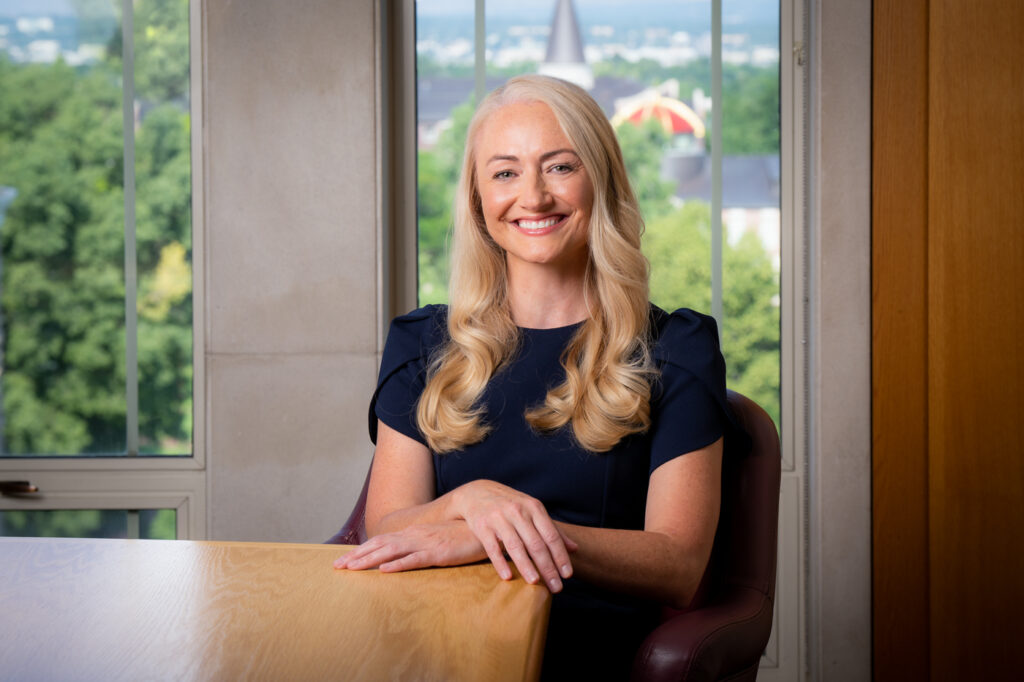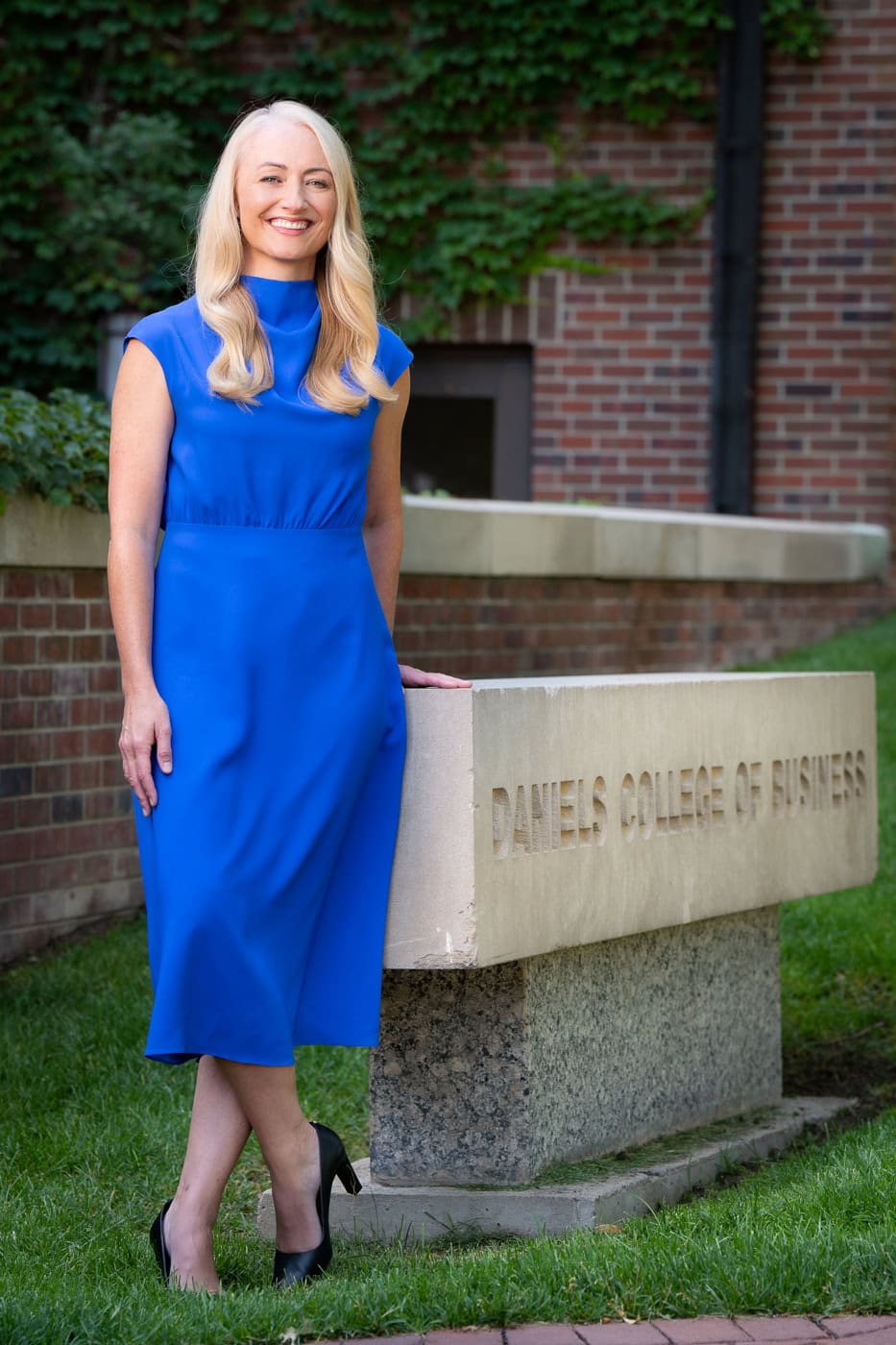Naomi Boyd is determined to prep students with the ‘entrepreneurial skills’ they need to succeed after graduation
 It’s an abrasive word, she has to admit.
It’s an abrasive word, she has to admit.
But there aren’t many others Naomi Boyd could use to so succinctly describe the challenges facing the business world—and the solutions needed to overcome them.
“‘Disruption’ as a distraction is a bad thing,” she said. “‘Disruption’ as innovation is a good thing.”
And in her new role, as dean of the Daniels College of Business, Boyd says she sees the perfect opportunity to shake things up.
“In academia, people are hesitant to change; they are not very trusting,” she explained. The ripples from a global pandemic are one thing, “and on top of that, we have AI and cyber and blockchain coming into our professional and personal lives. How do we encapsulate that and channel it to be a mechanism for good? You have to call it disruption.”
Navigating the rocky terrain of a rapidly changing business landscape is going to take an entrepreneurial mindset, critical thinking and creative problem solving, Boyd said. It’s also going to take changes to the higher education system, so students can meet those needs.
Daniels, she believes, is up to the task.
“Everything’s being called into question, and we have so much value and so much to give,” she said. “I really hope that we can solve a lot of the problems that higher ed is facing by turning our focus back to doing really impactful research, having those corporate connections and really focusing on what our students need—because things have changed.”
What students need more of are what Boyd calls “entrepreneurial skills.” Graduates should be innovators who aren’t afraid to fail but also know when it’s time to change direction.
Daniels as an institution is well positioned to give them what they need, she said. It’s a nimble, private institution with a deep network of corporate partners and an even deeper history of ethical leadership.
And Boyd is ready to lead the way, with her diverse background in academia, industry and the arts.
An artistic approach to business
Boyd was born in Guatemala, where her parents ran a school for several years. The family briefly lived with the Amish in Louisiana and on a West Virginia farm, before settling in Dallas, Texas.
Her family loved the outdoors—kayaking specifically—which meant regular trips to Colorado.
Boyd, meanwhile, felt more comfortable in a dance studio. Originally, ballet was simply a supplement to the flute she played in her arts-focused middle school. But the more time she spent in slippers, the deeper she fell in love. She danced in her high school program; she worked intensely after the final bell rang; she stretched while she did her homework.
She entered the University of Texas as an economics major—until freshman orientation, where a grumpy professor turned her off from the program entirely. She turned back to dance, and her passion burned even brighter.
“I love the physicality of [dance], the incremental improvement every single day,” she said. “I have no regrets because I feel like my quantitative skills and my analytical skills were actually honed more by being a dance major than being a business major. We had to watch shows every week and write these in-depth research papers. We had to put ourselves in the choreographer’s shoes and analyze these really complex performances.”
The University of Texas is also where she developed empathy for first-generation students. Boyd was the first in her family to go to college in the “traditional” way, with on-campus housing and a meal plan. Her experience is also the root of her passion to help students figure out financial aid—something she had to handle on her own.
Pirouetting to a new field
Boyd was realistic about what came after graduation. She knew ballet would not be forever.
A spinal injury ended her career a couple of years later, and she moved into the next era of professional life: an economic development job with Market Lubbock, in Texas’ 10th-largest city.
Her exposure to a variety of businesses and her brief tenure with a food tech startup steered Boyd into an MBA program at Texas Tech University. She fit right in.
“I loved the creative inquiry; I loved the problem solving,” she said. “In my coursework there was a lot of ‘this is the outcome,’ and we had to try to figure out how to get there. It was like solving different puzzles and it was really hard, which I liked.”
She liked it so much, she decided to pursue a PhD, a degree that would provide opportunity for in-depth research, flexibility and career stability.
Her specialty lay in market microstructure—the way new technology affected everyday trading. For eight years, she offered her expertise in the Office of the Chief Economist at the U.S. Commodity Futures Trading Commission.
‘There is no glass ceiling that isn’t worth breaking’
Boyd’s first foray into academia came at West Virginia University, where she held a number of positions, including associate dean for innovation, outreach and engagement. She was proud to expand opportunities for students to gain exposure to industry, whether it was through regular trips to New York City or the student-managed investment fund that she established.
Fourteen years later, Boyd became the first female dean at the Virginia Commonwealth University School of Business. And it was hard.
“One of my best friends once asked me: ‘Are there some glass ceilings that are not worth breaking?’” Boyd reflected. “And I think a lot of women in leadership roles in academia can relate to this. If you were to break that ceiling, you’re going to be bloody, you’re going to be bruised, you’re going to have glass in your hair. And that’s the part that nobody talks about: You might break the glass ceiling, but you may fall on the floor and may not rise again.”

Prior to her role at Daniels, Naomi Boyd was a finance faculty at West Virginia University and dean of the Virginia Commonwealth University School of Business.
Boyd went for it anyway. She committed herself to student-centric programming, launching a pair of programs that enabled students to work hand in hand with industry executives. The opportunity to transform business education drove her to push on, as has a strong inner circle of friends and mentors.
“If you’re willing to pick yourself up off the floor and you have people who are willing to help you pick the glass out of your hair,” she said, “there is no glass ceiling that isn’t worth breaking.”
The road ahead
In her new role, Boyd says she will be candid and caring. She has high expectations, but also expects to be held accountable. She isn’t afraid to be challenged or have an open dialogue.
“In order for innovation to occur, people need to feel safe to try new things,” she said. “I want to allow this disruption to take place but always be there to catch people if it’s not working.”
“In order for innovation to occur, people need to feel safe to try new things. I want to allow this disruption to take place but always be there to catch people if it’s not working.”
Her first few months on the job have been focused on listening, meeting with Daniels’ many stakeholders—students, faculty, staff, alumni, donors, corporate partners and more—to better understand their experiences, needs and desires.
Now that her husband and three children have relocated to Colorado, with the academic year beginning, she’s energized—ready to disrupt Daniels and map the route ahead.
“You’re not ever going to achieve your goals if you don’t have a strategy and don’t have those key performance indicators in place,” she said. “I’m really here to not only bring people together and break down silos, but figure out what’s next for Daniels.”

Loved it ! Loved her story and think Dr.Boyd is an amazing person. She is a gem that will light up students and the school. She is amazing in all capacities.